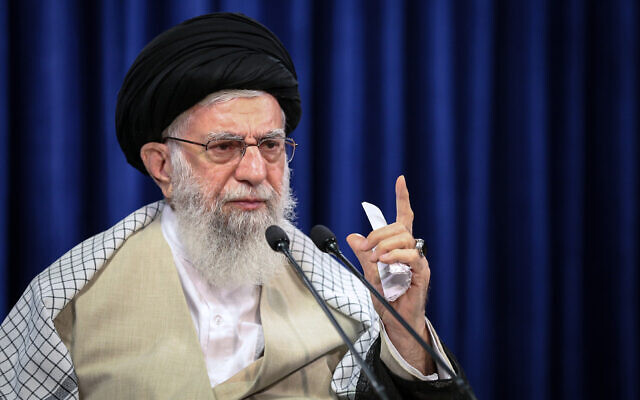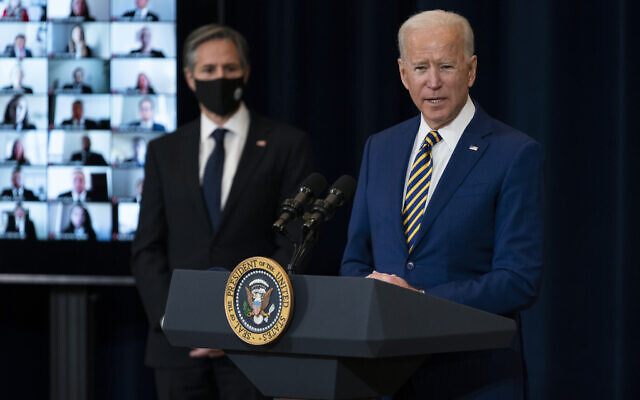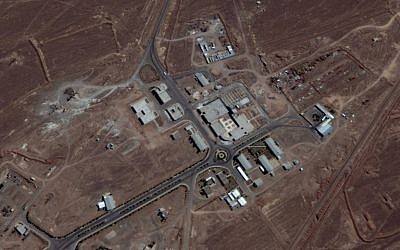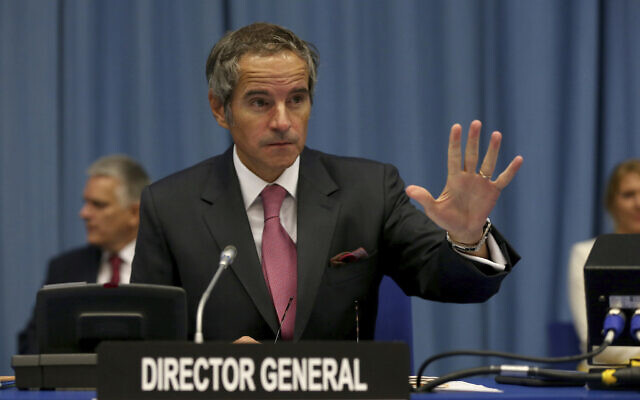IAEA head to visit Tehran, ahead of Iranian intention to end snap inspections; Merkel voices ‘concern’ to Rouhani over Tehran’s non-compliance

Iran’s supreme leader Ayatollah Ali Khamenei on Wednesday demanded action and not just words from the Biden administration as a condition for reviving the 2015 nuclear deal.
“The Islamic Republic will not be satisfied this time with words and promises,” Khamenei, who has the final say in the country, said in a televised speech.
“This time, only action, action. If we see action from the opposite side, we will act too,” he warned.
The new US administration of President Joe Biden has expressed readiness to return to the 2015 deal abandoned by Donald Trump, but has called on Iran to return to full compliance first.
Tehran says it is ready to return to its commitments on the condition that Washington does so first by lifting sweeping unilateral sanctions that have dealt a heavy blow to the Iranian economy.

Iran has gradually broken the terms of the deal, including in recent months, since Trump withdrew from it in 2018 and imposed punishing sanctions on Tehran.
Recent Iranian breaches have included exceeding the stockpile limit on enriched uranium, enriching beyond the permitted purity level, using more advanced centrifuges than permitted under the deal and producing uranium metal — a component of nuclear weapons.
Iran on Monday reiterated its warning that it will halt certain nuclear inspections if other parties to the deal “fail to meet their obligations” by February 21.

The Iranian foreign ministry said the move would see Iran end its adherence to the “additional protocol” of the nuclear accord, which prescribes intrusive inspections of its nuclear facilities.
In the meantime, the UN’s nuclear watchdog announced Wednesday that its head will travel to Tehran a day before the February 21 deadline.
International Atomic Energy Director-General Rafael Mariano Grossi “will visit Tehran on Saturday for discussions with senior Iranian officials in order to find a mutually agreeable solution for the IAEA to continue essential verification activities in the country,” the IAEA said in a statement.
Iran’s ambassador to the organization, Kazem Gharibabadi, tweeted that Grossi will be in Iran for “technical discussions with the Atomic Energy Organization on how to continue cooperation in the light of new arrangements.”

Also Wednesday, German Chancellor Angela Merkel held a rare telephone call with Iranian President Hassan Rouhani in which she voiced her “concern” over Tehran’s non-compliance with the nuclear pact, her spokesman said.
“She expressed her concern that Iran continues to fail to meet its obligations under the nuclear agreement,” spokesman Steffen Seibert said in a statement.
The chancellor also said that “now was the time for positive signals that create trust and increase the chances of a diplomatic solution,” he added.
Israel has voiced strong opposition to Washington returning to the Iran nuclear deal. Prime Minister Benjamin Netanyahu has long been a leading critic of the agreement, which was reached when Biden was vice president, and warned against reengaging with Tehran on the accord.
Netanyahu on Monday vowed opposition to those who oppose his hawkish stance toward Iran.
“Whoever supports our policies, I’m with him. And whoever endangers us, for example [on policies] regarding a nuclear Iran, which is an existential threat to us, so I oppose that, and I don’t care if it’s Democrats,” Netanyahu said.
Biden has not called Netanyahu after over three weeks in office. The lack of a phone call between the two leaders since Biden took office last month has raised eyebrows in Israel and the United States, though the White House has said the new American president was not intentionally snubbing Netanyahu.
The White House said Tuesday that Biden’s first phone call with a Middle East leader will be with Netanyahu.
As reported by The Times of Israel
